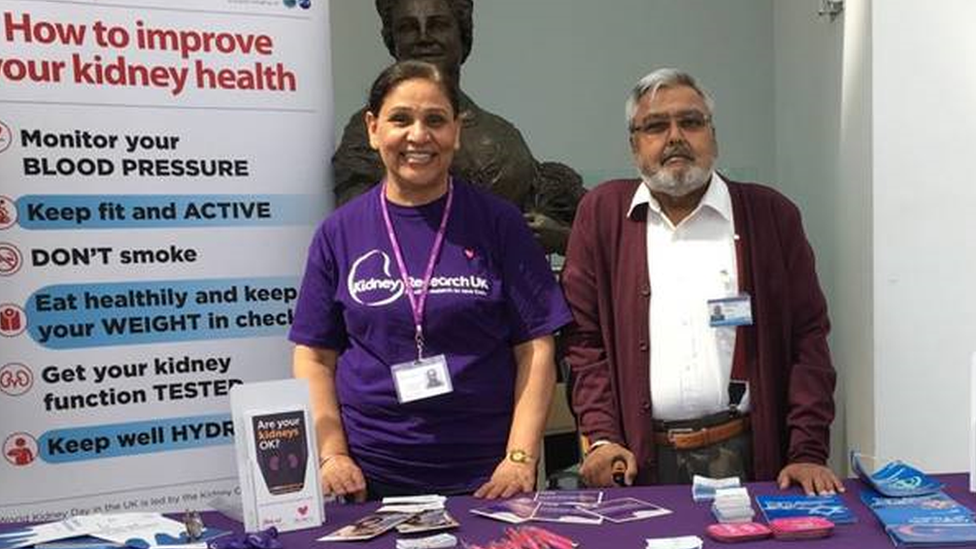'Kidney disease is not just a death sentence, you can live a full life'
- Published
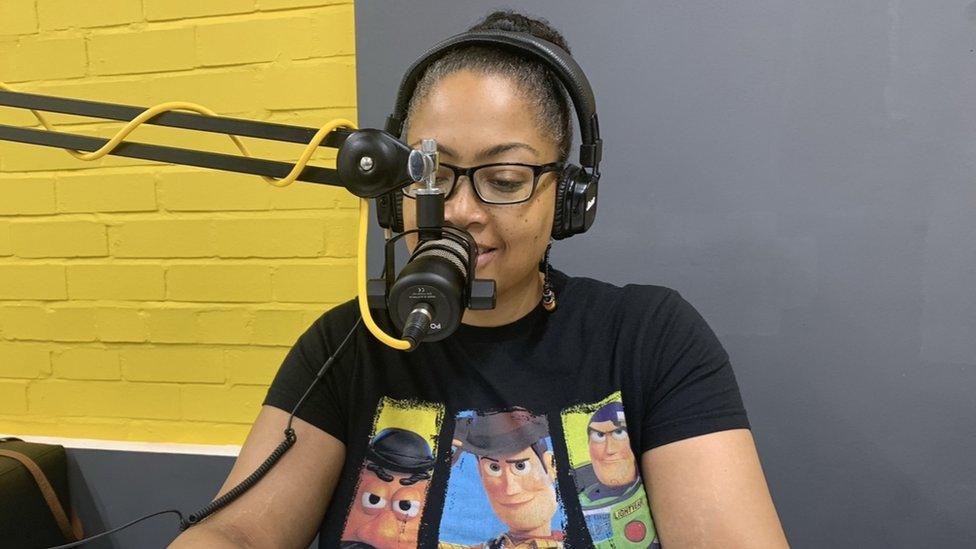
Dee Moore's listeners say they have learned more from her podcast then years of medical appointments
In 2018 Dee Moore was diagnosed with stage four kidney disease. Her initial shock gave way to despair that the diagnosis equalled a death sentence, but with the help of family and friends Dee fought back.
Four years on, she broadcasts messages of hope and encouragement from her Birmingham home to kidney patients across the world. She is also working with health professionals hoping to change the trajectory of kidney disease in black communities.
Dee, a mother of two, found out her kidney function had plummeted after she was admitted to hospital with extreme flu-like symptoms.
"I felt hot, I felt sweaty. I felt really run down and progressively I was getting worse and worse 'til, you know, everyday tasks became very difficult," she said.
"A week into being in the hospital was when they said that my kidneys were failing and they didn't know why.
"I don't drink, I don't smoke. I was exercising regularly... It was completely out of nowhere. I was really, really shocked."
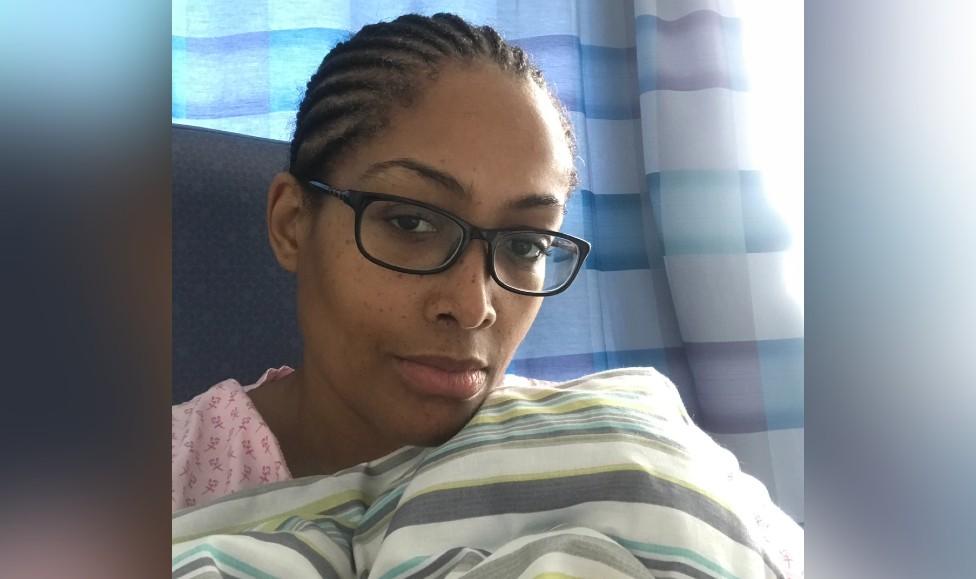
Doctors said an unknown infection had caused Dee's kidneys to fail
She spent almost two months in hospital undergoing test after test as doctors tried to work out what was wrong.
"I was fevering all night every night, soaking through my clothes. Soaking through the sheets like two, three, four times through the night.
"I got to the point where I just couldn't move. I just lay there and I was just like, 'this is too much, I can't do this any more'. I felt at that point that I was going to die."
Dee was put on a course of steroid medication, which helped.
In May 2019, she heard she may be six months away from needing dialysis. Dee was also told by the consultant her BMI was too high for her to be placed on the transplant list.
So she became determined to lose weight and to be as healthy as she could - to give herself the best chance should she one day need a transplant.
Exercise, hydration, regular rests and monitoring blood pressure are her regular routine.
To help her mental health, an "outpouring of love" from friends and colleagues brought her back from the brink.
Recalling the day she was told about possibly needing dialysis, she said: "I thought, 'no I'm not. I'm not going to be on dialysis in six months' time. I'm gonna prove you wrong'. And then I left the appointment and I went home and all the different emotions started to hit me."
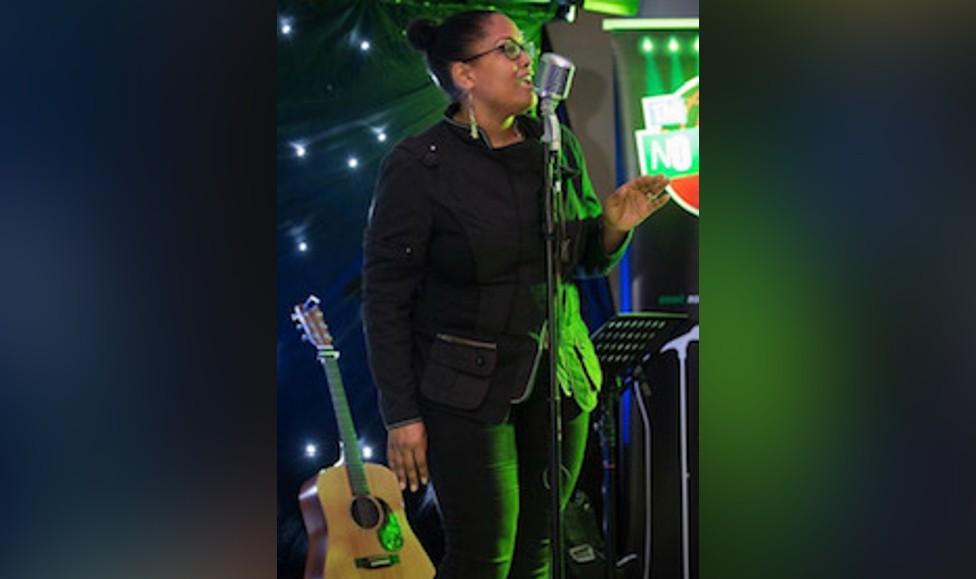
The singer and actress is now focused on her podcast Diary of a Kidney Warrior, which has been downloaded more than 12,500 times across 60 countries
A health coach helped Dee find the mantra she swears by today.
"She said to me, 'Dee, I want you to choose to live and I want you to say those words, I choose to live' and I sat there in silence. I didn't say anything. I didn't want to say anything.
"Eventually I just said 'I choose to live'. And I kept repeating it and getting louder until I sat there and I shouted 'I choose to live' at the top of my voice and that was the turning point for me."
Dee is under the care of a renal consultant and having regular tests to monitor drops in her kidney function. She is is still maintaining enough function to not yet need dialysis nor a transplant.

What is kidney disease?
More than three-and-a-half million people in the UK have chronic kidney disease, external (CKD)
But one million of these remain undiagnosed
People with diabetes, high blood pressure or cardiovascular disease may be more at risk
In early stages, chronic kidney disease is silent, but symptoms as it advances include blood in urine, swollen feet, muscle cramps and itchy skin
There are five stages of CKD, ranging from being at risk through to kidney failure
Kidney function can be tested through blood and urine samples
There is no cure for CKD but treatments can ease symptoms and stop it getting worse
Source: Kidney Care UK

Ethnicity adjustment
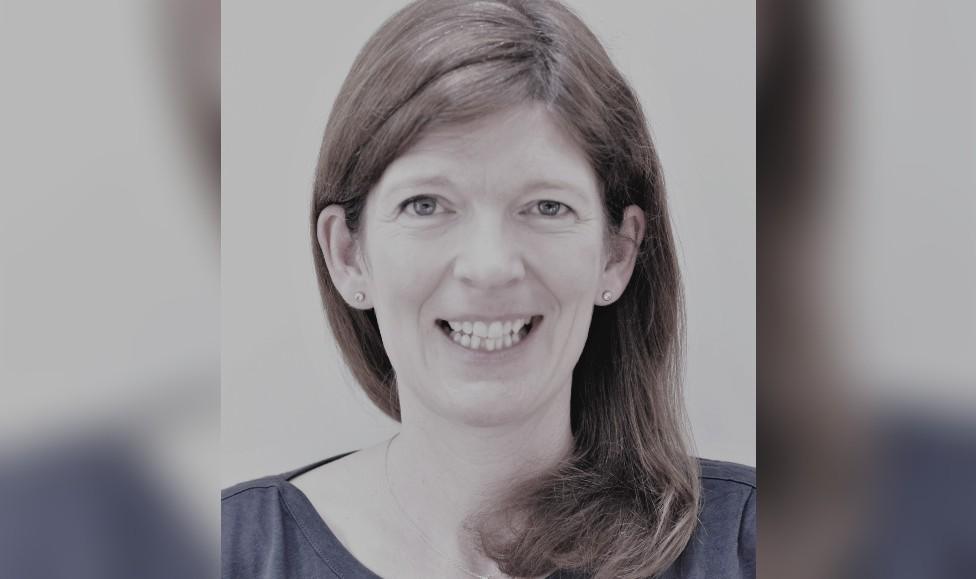
Nephrologist Dr Kate Bramham is optimistic the change in guidelines for testing patients of black ethnicity will lead to better outcomes
As Dee learned more about kidney disease she discovered the stark inequalities faced by patients of black ethnicity.
People from black, Asian and other minority ethnic backgrounds are five times more likely to require dialysis than white patients, according to research from kidney charities., external
This is in part due to higher levels of diabetes and high blood pressure in these communities, which are known risk factors for CKD.
Black patients in the UK are "grossly disproportionately affected", said Dr Kate Bramham, an honorary consultant nephrologist at Kings College Hospital NHS Foundation Trust.
"There are definite genetic contributing factors, but also undoubtedly socio-economic factors and how we deliver healthcare that are likely to contribute.
"Sadly, people who have got kidney failure who are of black ethnicity are much less likely to get a kidney transplant, and then much more likely to wait longer.
"Certainly there are preventable deaths."
Until August last year, it was also considered best practice to adjust kidney test results for people of black heritage, said Dr Bramham.
A test called estimated glomerular filtration rate (eGFR) calculates how well kidneys are functioning based on the level of a waste product called creatinine.
For all patients, eGFR is modified for age and sex. But for patients identified as black, it was previously recommended by The National Institute for Health and Care Excellence (NICE) a correction factor should also be applied based on their ethnicity.
Research by Dr Bramham and others, external found this calculation meant some patients' kidney function was overestimated by up to 20%. "We, by using [those adjustment factors], have been falsely increasing kidney function," she said.
"That, obviously, is wrong. But also it's inappropriate to use race-based medicine to make decisions about care."
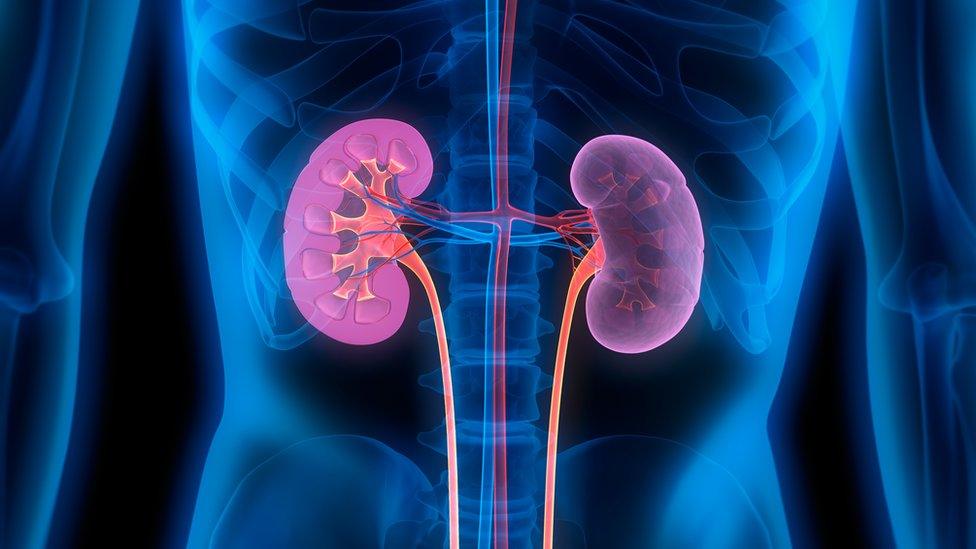
NICE guidelines updated in August 2021 stated adding an ethnicity adjustment to eGFR equations may not be valid or accurate
The approach, based on US studies dating to 1999 that found, external higher average creatinine levels in people of black and African American heritage, was inappropriate to apply to European black populations, Dr Bramham said.
She was "delighted" when NICE dropped the ethnicity adjustment guidance from CKD guidelines, external and is now chairing a working group aiming to standardise kidney function measurements across the UK.
The doctor is optimistic the removal of the ethnicity adjustment will allow early disease to be caught and treated.
"We're at the moment unsure exactly what different laboratories are reporting," she said. "I think it will take time. But I think that we really need to do it as quickly as possible to ensure that this health equity gap is not exacerbated."
For Dee, the new approach is a "massive step in the right direction".
"It was outdated, it was wrong. It was institutionally racist," she said. "I couldn't be happier that the guidance has changed.
"Ultimately, my fear with the adjustment is that there are many people that may not even be here because their treatment was delayed as a result of it."
Five out of 19 hospital trusts in the West Midlands were able to tell the BBC they were working to the new NICE guidelines. The remainder are yet to respond.
Kidney warrior
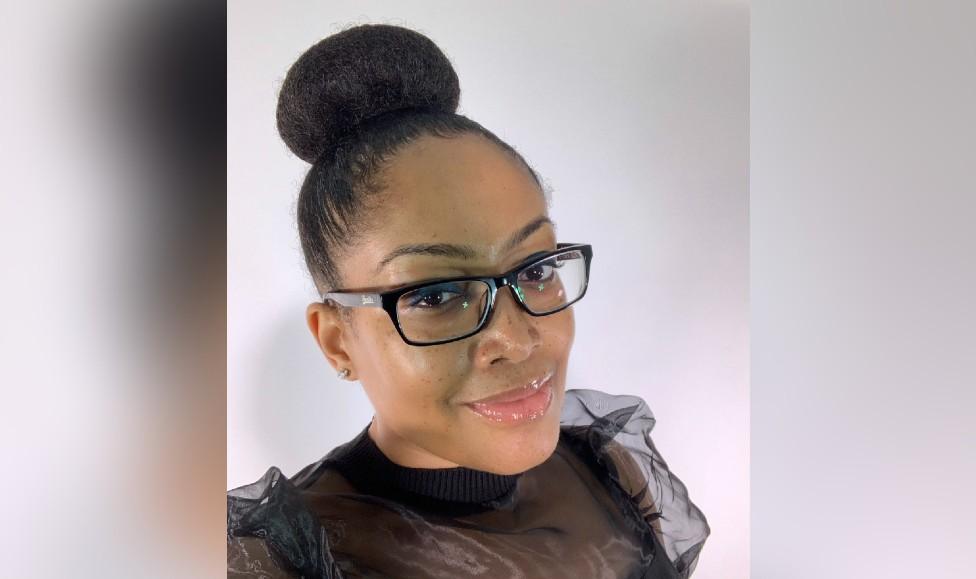
The podcaster is proud of the inclusive community she has built
In 2020 Dee started the Diary of a Kidney Warrior podcast, external, to reach out to other patients with CKD.
Working in partnership with Kidney Care UK, external, she has since interviewed dozens of health experts and patients, including 1xtra presenter DJ Ace and Perry Barr Labour MP Khalid Mahmood.
"I want to take somebody from that point of getting the diagnosis to being empowered with the knowledge that they need to thrive with the disease," she said.
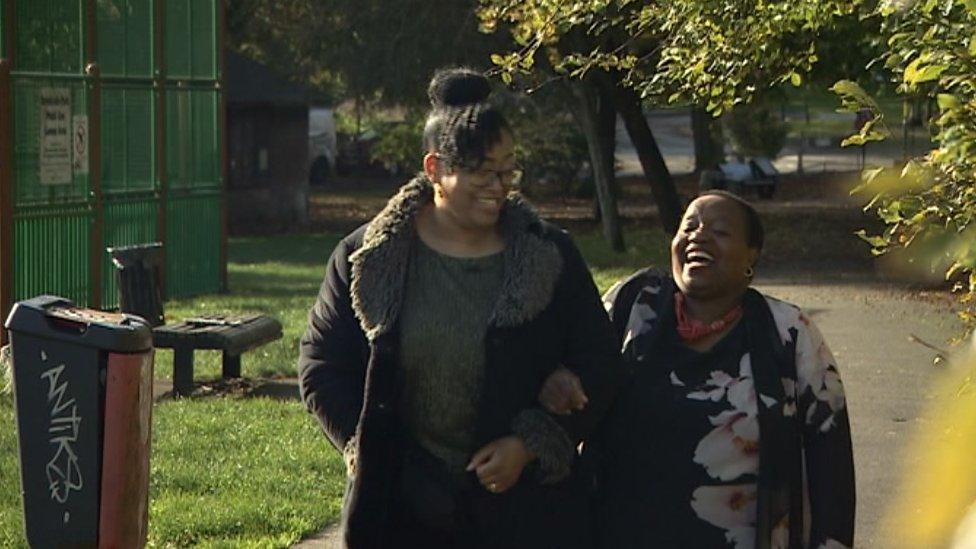
Retired kidney specialist nurse Pat Simoyi says her friend Dee shares a passion for educating people about CKD
She booked CKD specialist nurse Pat Simoyi on to the podcast after meeting her at an event and the pair are now close friends.
"She's so driven with what she's doing. And I love to see her succeed and I think she is succeeding," said Pat.
"If I could have cloned another Dee as well, I would clone a lot of them. People, when they understand something and they give [knowledge] to someone else in the same situation, it's better than getting it from a professional."
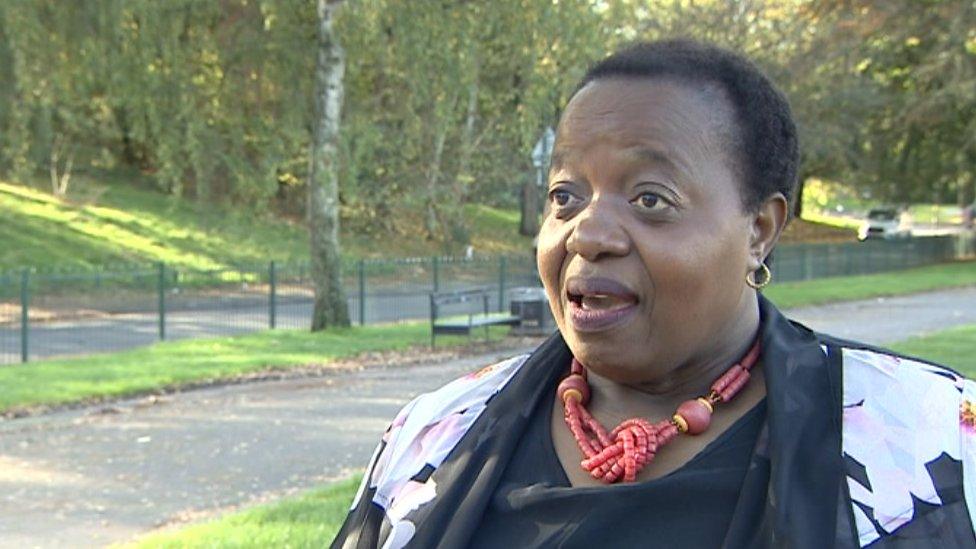
Experienced kidney nurse Pat Simoyi says adopting a positive outlook helps patients
Dee, who is sharing her patient voice with Dr Bramham's working group, feels proud of what she has achieved with her podcast but wants to go further.
"It's been very cathartic for me. It's given me a focus. It's given me even more of a drive and determination to live my life to the full," she said.
"I want to share the message with kidney patients across the world that kidney disease is not just a death sentence, you can live a full life. You might have to do things differently. But you can live a full life.
"It's now 2022 and I'm not on dialysis, so I'm proof that it's possible. There is hope."
If you've been affected by any of the issues in this article, information and support is available at BBC Action Line.

Follow BBC West Midlands on Facebook, external, Twitter, external and Instagram, external. Send your story ideas to: newsonline.westmidlands@bbc.co.uk, external
Related topics
- Published30 July 2022
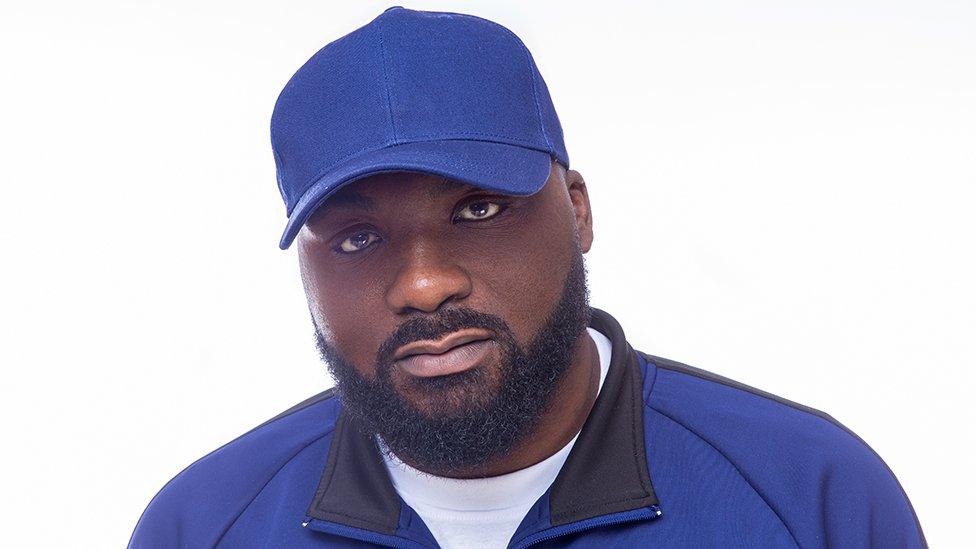
- Published3 July 2020
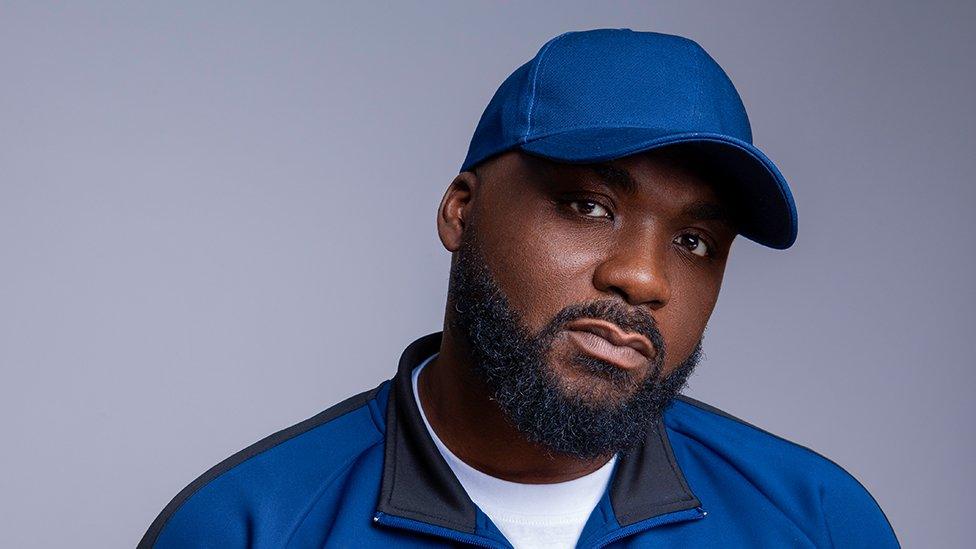
- Published14 February 2022
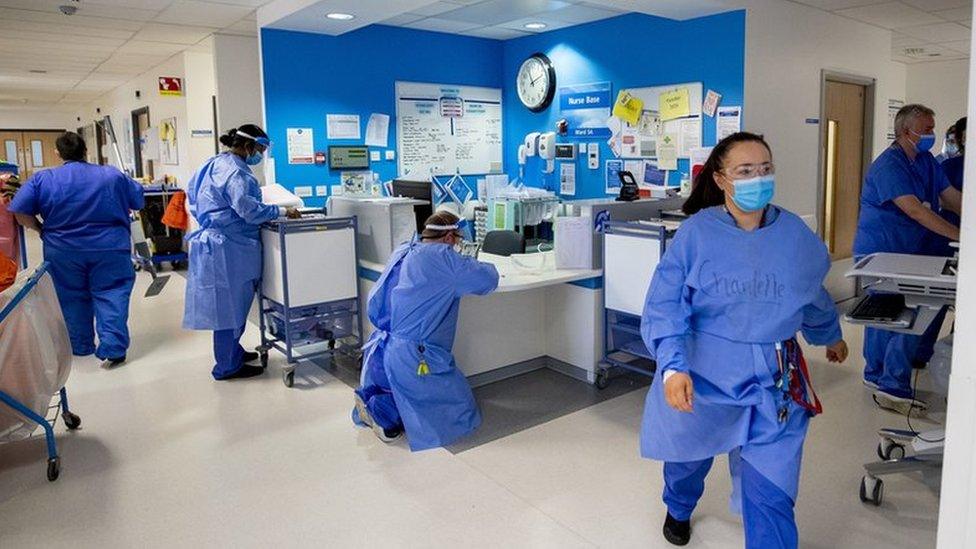
- Published11 October 2017
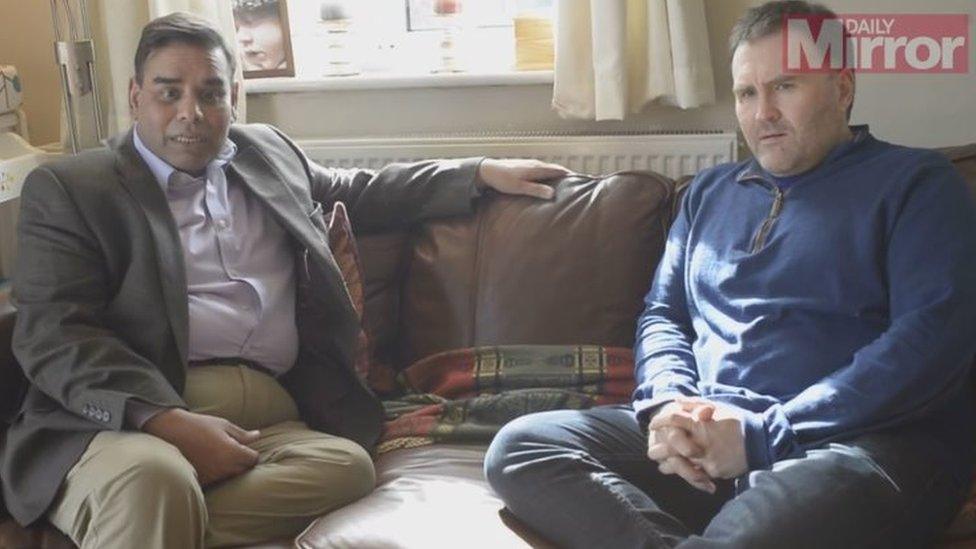
- Published26 September 2022
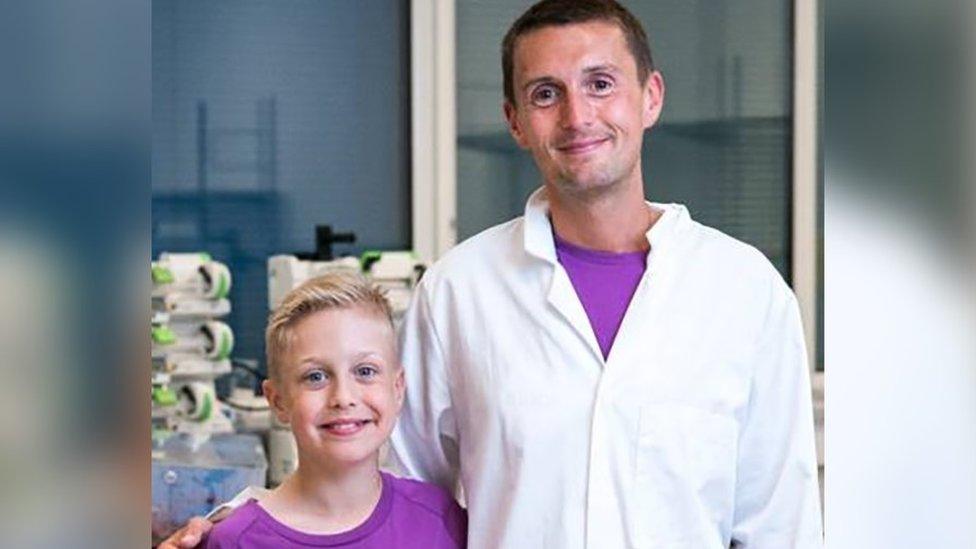
- Published19 July 2022
